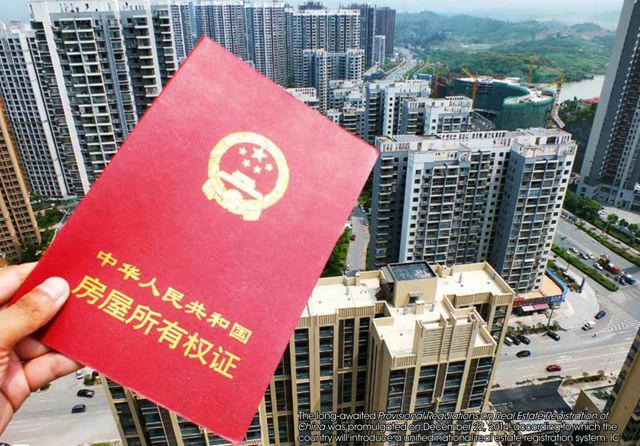Countdown to Unified Real Estate Registration
by+Zi+Mo
Chinas decades-long system in which tracts of land and the buildings on them are registered and licensed by different government departments is in its last days. Provisional Regulations on Real Estate Registration of China was promulgated on December 22, 2014, and will officially take effect on March 1, 2015, which will effectively end the old system. According to the new regulations, the country will introduce a unified national real estate registration system.
Roadmap
According to the Regulations, the Ministry of Land and Resources will reg- ister immoveable property including land, residences, forests, grasslands and maritime space, so as to form an integrated property information platform to allow government departments to share information on property ownership and provide data for future formulation of policies concerning property.
Over past decades, the registration of property rights of land, houses, farmlands, forests and aquatic areas were handled by land and resources, housing and urbanrural development, agriculture, forest, and fishing departments, respectively. “Unified real estate registration is international practice,” comments Wang Xiaoying, a research fellow at the Chinese Academy of Social Sciences. “In the planned economy era, decentralized property registration was designed only for the convenience of divisional management, and did not take the protection of property rights into account.” Lacking unified property classification standards and an integrated information platform, real estate registration information was thus hard to be shared and transparent. In this context, a “roadmap”to build a unified real estate registration system emerged.
In 2007, the Property Law of China was enacted, which put forward the principle of building a unified national real estate registration system for the first time. However, the system saw no significant advancements until 2013. That year, on November 20, the executive meeting of the State Council of China passed a decision to establish an integrated registration system for immovable property. In February 2014, the State Council approved the “real estate registration inter-department joint meeting”system headed by the Ministry of Land and Resources. Then, on June 16, the website of the Ministry of Land and Resources announced that the ministry had launched the research and design of the real estate registration information platform. At the end of November 2014, China Law Center for Land and Resources under the ministry was approved to be renamed Real Estate Registration Center.
Statistics released by the Ministry of Land and Resources show that half of major Chinese cities have launched prepa- rations to build an integrated real estate registration system.
Challenges Ahead
With the implementation of the Provisional Regulations on Real Estate Registration, unified property registration will be gradually realized nationwide. Of all immoveable property involved, regulations covering residences undoubtedly have drawn the greatest concern. “Property rights for houses is related to interests of people from all walks of life,” remarks Zhao Xijun, vice dean of the School of Finance at the Renmin University of China. “A unified real estate registration system is important for stable development of the real estate market and will lay a foundation for collecting property taxes and inheritance taxes.”
Zhang Dawei, director of the Market Research Department of Centaline Property Agency Ltd., also points out that building a unified immoveable property registration system will accelerate the sharing of property information nationwide, thus paving the way for levying property taxes. Today, most large and medium-sized cities have established a house evaluation system. A unified real estate registration system will remove the last technical obstacles on the road to collecting property taxes.
Some believe that once implemented, the unified real estate registration system will cause home prices to drop and even help push forward the countrys already high-profile anti-corruption campaign since the system will make property ownership information more transparent, thus exposing officials who buy multiple houses with illicit earnings. Moreover, analysts note that fearing the launch of property taxes, owners of multiple homes will sell, so supplies of existing homes will increase, thus causing a drop in housing prices. Even Pan Shiyi, chairman of real estate developer SOHO China, declared via his microblog that “home prices will immediately decline if the new policy [an integrated registration system] is executed.”
However, others disagree. Li Zhanjun, chief researcher at China Real Estate Association, notes that the registration system was not designed to control the real estate market, but aimed to establish an integrated information platform. Even if it urges some owners of multiple homes to sell, the supply-demand relationship of the real estate market wont change much.
Ren Xingzhou, director-general of the Institute of Market Economy at the State Council Development Research Center, noted that the essential function of the unified real estate registration system would be clarifying property ownership, protecting property rights and transaction security, and creating a base for other long-term measures to control the property market and maintain rational investments in the market, rather than cutting home prices and coping with corruption.
Clarifying property ownership is the first step to building a unified real estate registration system. Due to the urban-rural dual real estate system that China adopted for decades, some property rights cannot be clearly defined. Even in cities, many houses come with limited property rights. According to Fu Qilin, a professor at China University of Political Science and Law, the biggest challenge ahead is unclear property rights in rural areas, where land function is varied and they lack unified standards for rural house registration.
The issuance of the Provisional Regulations on Real Estate Registration is just the first step, and many difficulties remain ahead before the goal of “enabling property registration information to be shared by different departments and open to inquiry by 2017” can be reached, as set by the Ministry of Land and Resources.
China Pictorial2015年2期
